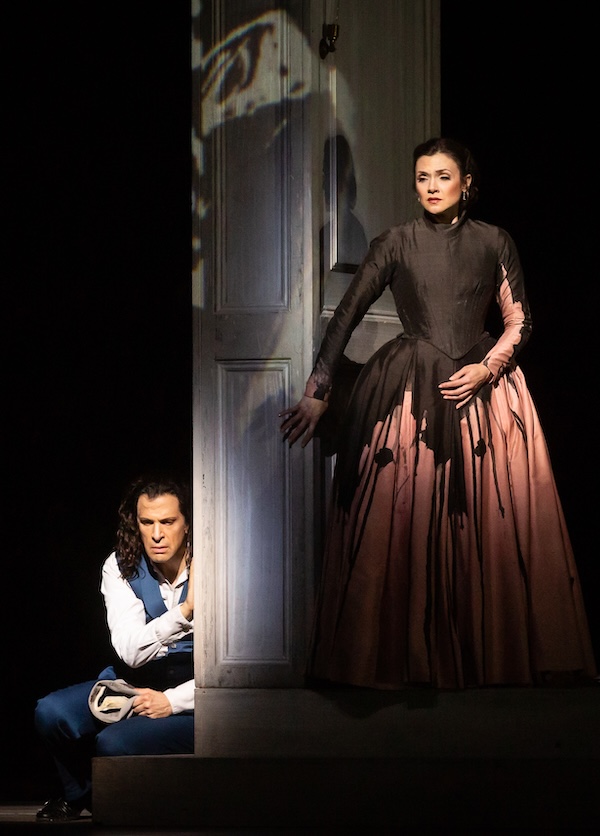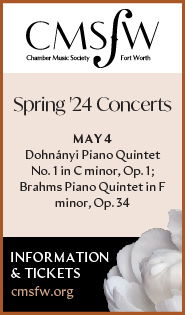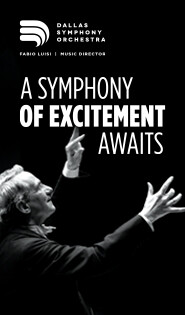HGO’s compartmentalized staging makes for a mixed “Don Giovanni”

Mozart’s Don Giovanni famously ends with its sex-addict antihero being dragged down to hell for his sins. But what if his punishment really begins in this world?
Danish stage director Kasper Holten gives the saga that spin in his production, which Houston Grand Opera introduced to the United States in 2019 and brought back to the Wortham Theater Center on Friday.
Holten’s approach, staged here by revival director Greg Eldridge, centered on Don Giovanni himself. Bass-baritone Luca Pisaroni’s Don, tall and—at the outset—elegant, launched into his amorous escapades with abandon. Between adventures, though, he lolled indolently off to the side. Maybe he was weary of the skirt-chasing merry-go-round, as evoked by designer Es Devlin’s set.
The centerpiece was a two-level evocation of an 18th-century villa, replete with doors that suggested rooms for assignations—and yes, it revolved, revealing more spaces for the Don’s escapades. A labyrinth of passages and staircases, it was imposing, yet cramped, all the more so when names of the Don’s conquests—conjured up by video projections—flashed onto it by the dozens. The whole setting evoked claustrophobia, literal and mental, and that obviously took a toll on Don Giovanni. At the final blackout, Don Giovanni stood broken at center stage, stuck in his hell on earth.
In another twist on the story, Holten and Eldridge shaped the opening scene to make clear that Giovanni had had his way with Donna Anna, rather than being rebuffed by her as in the traditional telling. She ultimately expressed remorse, at least in the supertitles, through a loose translation of the close of “Non mi dir,” her Act 2 aria.
One might question whether turning Donna Anna into the story’s second sinner adds anything of value. Nevertheless, Pisaroni and the rest of the cast embraced the story’s drama and comedy with equal vigor.
Pisaroni sang suavely when Giovanni went into wooing mode, jovially when he was playing tricks, and vehemently when he defied his opponents. Only in the highest phrases of the “Serenade” did he fall a little short of smoothness.
Some of the evening’s most scintillating moments bubbled up when Pisaroni and bass-baritone Ryan McKinny, who played the Don’s sidekick, Leporello, plunged into the bantering recitatives that help drive the story. Their voices became verbal kaleidoscopes as they put over the humor, agitation, camaraderie and conflict of the master-and-servant repartee.
McKinny could hardly have made a more complete transformation—vocally or theatrically—from when he portrayed the languishing Amfortas in Wagner’s Parsifal for HGO only three months ago.
The same booming tones occasionally popped up, as in the most majestic moments of the “Catalogue Aria,” Leporello’s tally of his master’s conquests. By and large, though, McKinny’s singing was nimble, colorful and full of life.
In the opening scene, as Donna Anna pleaded with Don Giovanni not to flee, soprano Andriana Chuchman sounded emphatic but dry. Her voice gradually settled in, though, growing vibrant and focused, and she delivered “Or sai chi l’onore” with vengeful energy. She later brought breadth and dignity to Anna’s “Non mi dir.”
Mezzo-soprano Sasha Cooke, who played the heroine of Ethyl Smyth’s The Wreckers for HGO in 2022, returned as Donna Elvira, who rages at Don Giovanni for abandoning her—but can’t stop desiring him.
At the outset, Cooke put all the emphasis on Elvira’s fury, and the impressiveness of her voice’s fullness and heft began to pall because of the one-sidedness. But her Elvira grew more sympathetic as she gave less-vehement tones more of a role—and as her fluency with Mozart’s florid lines added a new flavor.
Thanks to soprano Erika Baikoff, Zerlina—the country girl Giovanni sets his sights on—came across as more than the usual ingénue.
As Giovanni began wooing her in “La ci darem la mano,” Baikoff responded in light, girlish phrases. But her voice swelled as she began to fall under his sway. When Zerlina responded to her bridegroom’s wrath with the contrite “Batti, batti,” Baikoff brought Mozart’s lyricism even more glow and generosity. Zerlina became as noble in her way as the bluebloods around her.
Tenor Kang Wang sang with a vigor and assertiveness that helped counteract the notion that Don Ottavio, Donna Anna’s sweetheart, is a milquetoast figure. But he rarely tried to bring tenderness to Ottavio’s “Dalla sua pace,” and the coloratura was insecure in “Il mio tesoro.”
As the Commendatore, Anna’s slain father, condemned Don Giovanni from beyond the grave, bass Patrick Guetti unleashed voluminous tones. Baritone Normal Garrett brought the role of Masetto, Zerlina’s bridegroom, a voice smaller than those around it, but he still put across Masetto’s indignation in the face of Zerlina’s supposed unfaithfulness.
The HGO Orchestra didn’t capture the wallop of the Overture’s beginning—the strings lacked that kind of weight—but the group generally brought Mozart crispness and vitality. Conductor Jane Glover’s brisk tempos put those qualities in the forefront, and her approach kept Mozart’s momentum going.
But her pacing seemed relentless at times. Chuchman’s final phrases in Anna’s “Or sai chi l’onore” sounded choppy, Pisaroni’s last moments in Giovanni’s “Champagne Aria” a bit breathless. The issue may have been that Glover didn’t slip in split-second opportunities for them to breathe. Doing that, after all, is part of the conductor’s art.
Don Giovanni runs through May 3 at Wortham Theater Center. houstongrandopera.org


